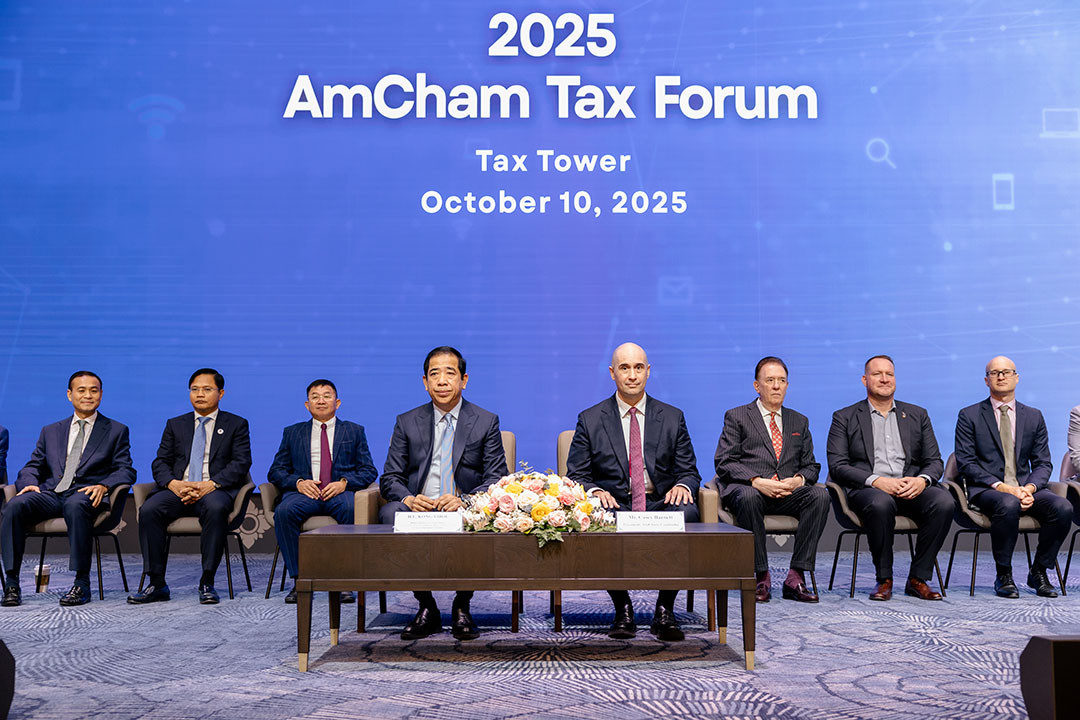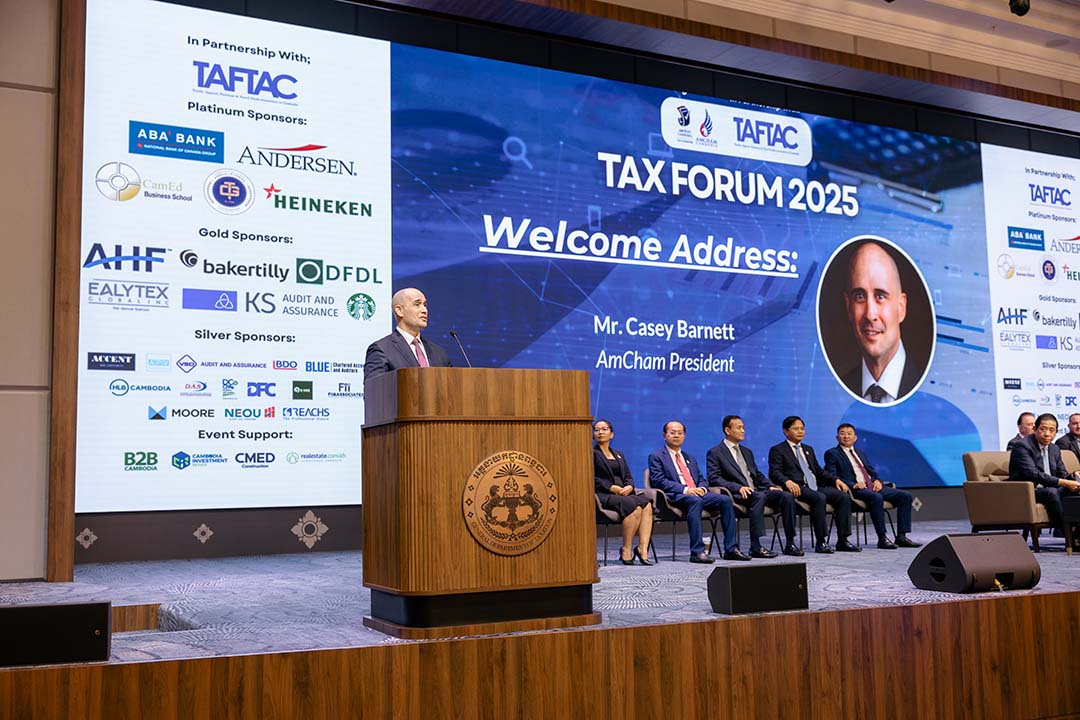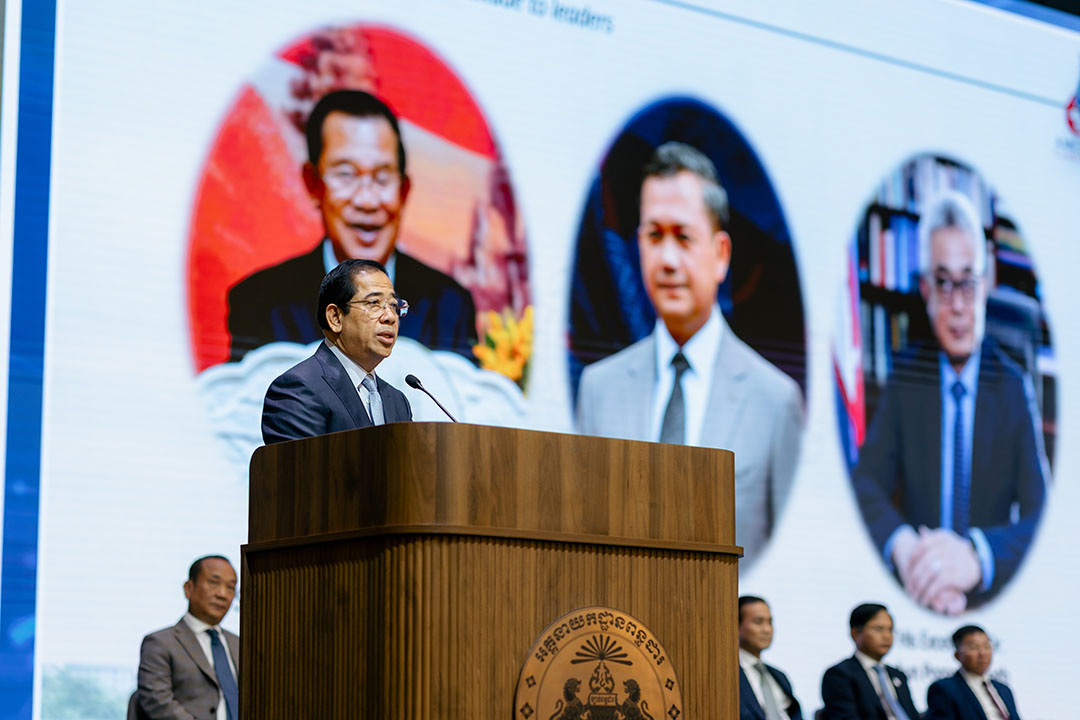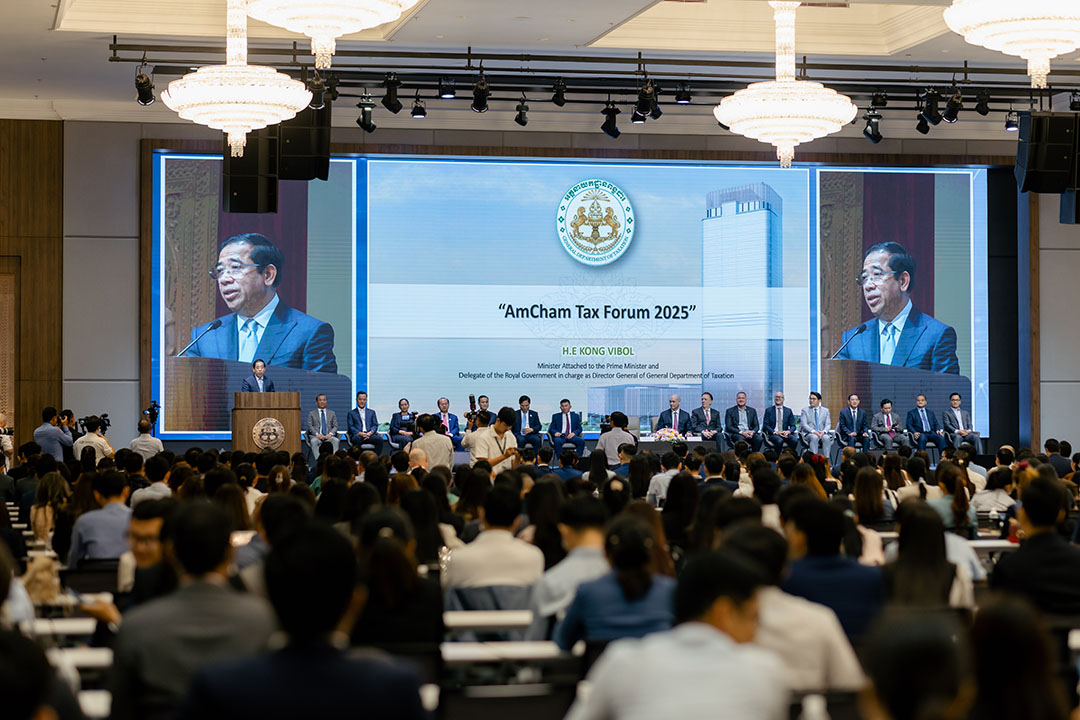
The American Chamber of Commerce (AmCham) in Cambodia hosted the 2025 AmCham Tax Forum on October 10 at the new Tax Tower in Phnom Penh, bringing together senior leaders from the General Department of Taxation (GDT), international advisors, and the American business community for a full day of practical guidance on tax policy and compliance.
The program opened with welcome remarks from Casey Barnett, President of AmCham, followed by a keynote address by H.E. Kong Vibol, Minister Attached to the Prime Minister and Director General of the GDT.
“When I first came to Cambodia, all the tax filings were done on paper, and one of the key revolutions that H.E. Kong Vibol and the hard working officials at the General Department of Taxation have introduced is the digitised tax system, starting with e-filing, e-payment, e-registration, and now beginning with the DTA registration and application system—the single portal for companies to manage their tax payments, manage their tax filings,” shared Barnett, highlighting the various efforts and achievements made by the GDT to modernise and update the country’s tax systems.
He added:
This digitisation has provided transparency, ease for taxpayers, and for the General Department of Taxation, which is reflected in the significant increase in the collection of tax revenue, and also the ease for which investors can comply with their tax obligations.
Speaking also on the role U.S. business plays in supporting Cambodia’s economy, Barnett underlined that a consistent volume of approximately 40 per cent of Cambodian exports go to the United States every year. While the number of American companies legally registered in Cambodia remains small, and the amount of foreign direct investment (FDI) coming in from China continues to be much more significant, he pointed out that much of this FDI is still intended to produce goods to be sold to the American market.
“While some may see this as a concentration of—or an overdependence on—the U.S. market, it is in fact because the United States is the largest consumer market in the world,” said Barnett.
We have the largest proportion of final consumption of consumer goods, and because of this—because of the willingness of the United States of America to accept and buy Cambodian goods—this is pulling investment to factories and production, and we see an opportunity actually to increase. We hope that the production of American goods, American brands in Cambodia, for exports to the U.S. market, will increase.
“We see that the exports of Cambodia to the U.S.… is still a fraction of the exports that Vietnam sends to the United States, for example, and we believe there's great potential for Cambodia to increase that investment,” he concluded.

Data Sharing, AI and New Prakas in Cambodia's Tax Administration
In his keynote address, H.E. Kong Vibol spent some time highlighting the many features of the brand new Tax Tower in Phnom Penh, which includes a ballroom, an auditorium, various conference rooms, several office and commercial rental spaces, a shopping mall, an internal water treatment plant, and the GDT's own data centre.
“We built a Tier 3 data centre, and we hope our data centre can be the cloud for businesses in Cambodia,” said H.E. Kong Vibol “If there are any banks or other businesses that don't want to build their own data centre, this is the data centre for you.”
Speaking more on the topic of data, the GDT Director General expressed his wish for a ‘one voice’ government approach that allows for more data sharing between different government agencies, as well as between the public and private sectors, in order to strengthen tax collection practice.
“In order for us to collect more revenue, we need big data sharing among government agencies, and the private sector as well. For example, information on land and property registry. How do we collect tax on property without information? The GDT is not the agency to register property owners, so we need this kind of data to be shared with us in order for us to collect,” said H.E. Kong Vibol.
Data is golden. You get one piece of information, and somehow, you can have enough information to collect revenue from a few million people—just from one piece of information.


The GDT Director General also shared that the tax administration is in the process of developing artificial intelligence-based tax services.
“We are developing AI also for tax services… We might use AI for some frequently asked questions, and we will also try to integrate with existing AI tools, like ChatGPT,” he shared.
H.E. Kong Vibol also provided brief updates on two new Prakas, one concerning the international waterway transport of goods and air transport, and the other on the tax obligations of board of directors and company directors. On the subject of capital gains tax, the Director General clarified that while a Prakas was issued, it has not yet been fully published because its details are still under discussion between the Ministry of Economy and Finance, GDT and the private sector.
“I will request it to be put on hold for a while to discuss and see how we can improve [the capital gains tax Prakas] to be better. We will consult with the private sector more, because I don't want misinterpretations and misperceptions that will lead to chaos and backfire, so when we implement it, we have to be sure that all stakeholders have agreed to it,” he said.
Latest Tax Updates in 2025 and Cambodia's Future Business Outlook
The full-day forum's sessions tackled tax audits and appeals, recent tax updates (including VAT on airlines and shipping), transfer pricing, international tax agreements, QIP obligations, customs post‐clearance audit, and best practices in accounting records and sole proprietorship obligations. Speakers and moderators included senior officials from GDT and General Department of Customs and Excise (GDCE), alongside experts from Andersen, Baker Tilly, DFDL, EY, PwC, the Tax Working Group, and industry associations.
_20251013_175005.jpg)
Cambodia is prioritising predictable, transparent tax administration as it works to attract high-quality investment and to support exporters. The forum’s public Q&A and technical breakouts underscored a shared focus by GDT and industry on clear rules, digitisation, and streamlined procedures—critical building blocks for investment decisions and long-term job creation.
A constructive backdrop for business:
- On July 28, 2025, Cambodia and Thailand agreed to an “immediate and unconditional” ceasefire after talks in Malaysia, a breakthrough reached under international pressure and with U.S. involvement—notably from President Donald Trump—reducing near‐term regional risk and uncertainty for businesses.
- On July 31, 2025, the White House issued an executive order modifying reciprocal tariff rates, setting Cambodia’s rate at 19 per cent—a key change from earlier higher levels and part of a broader tariff reset framework.
- Reuters subsequently reported that Cambodia’s 19 per cent rate—down from previously signaled 49 per cent and 36 per cent—has been vital to sustaining the country’s garment and footwear sector while negotiations proceed.
- Complementing this, Cambodia announced zero tariffs on most U.S. goods beginning August 1, a step confirmed publicly by Deputy Prime Minister Sun Chanthol; analysis from BowerGroupAsia noted zero-tariff access across more than 11,000 HS lines under the arrangement.
These developments arrive as the United States remains a leading destination for Cambodian exports. According to USTR, total U.S.–Cambodia goods trade reached USD 13.0 billion in 2024, including USD 12.6 billion in U.S. imports from Cambodia, reflecting strong and consistent market demand for Cambodian products.
With momentum in trade ties and continued regulatory modernisation, AmCham Cambodia has stated it will sustain its partnership with the GDT to ensure members have timely, practical guidance. The Chamber will also convene follow-on briefings to track implementation of reforms and business‐relevant international developments.
Parts of this article were adapted from a supplied press release.